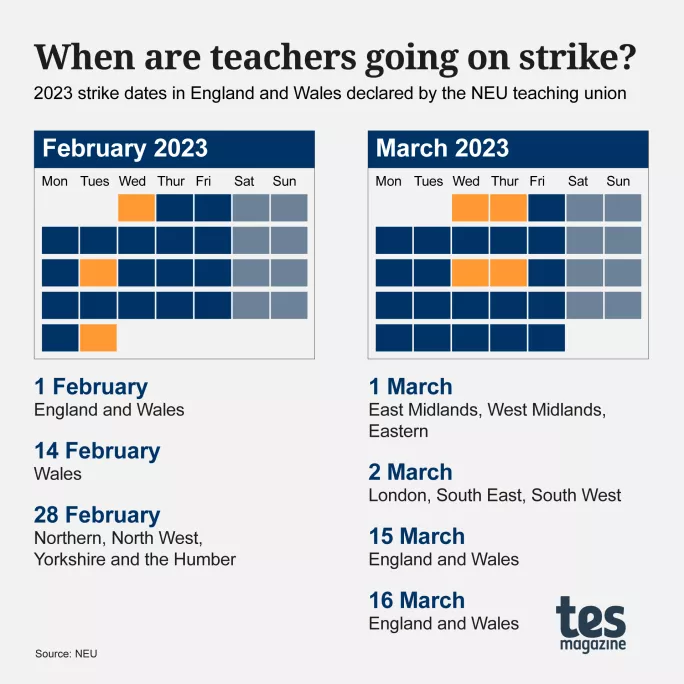Strikes: Heads warn over ‘hardline’ DfE approach

School leaders are facing tough decisions on school closures as expectations from the Department for Education are “incompatible” with the reality on the ground, Tes has learned.
With the first strike day less than a week away, headteachers have started running risk assessments and planning for pupils and staff.
Yesterday, the NAHT school leaders’ union said heads “should not feel under pressure” to reply to a Department for Education email requesting information about their “anticipated operational status” on 1 February.
But as NAHT general secretary Paul Whiteman said yesterday, it is “highly unlikely that leaders will, at this stage, be able to say with confidence how the strike action will affect their schools next week”.
- NAHT: DfE school strike data trawl can be ignored, heads told
- Strikes: School leaders prepare for ‘lockdown 2.0’ as strikes loom
- Support staff: Don’t cover teacher colleagues on strike, TAs told
The NEU teaching union announced last Monday that teachers would go on strike from 1 February after 90 per cent of teacher members voted for strike action in a ballot turnout of 53 per cent.
Next Wednesday will be the first of seven strike dates scheduled to take place across England and Wales in February and March.
Last week, the DfE issued guidance to schools advising that headteachers should take “all reasonable steps to keep the school open for as many pupils as possible”.
The DfE suggested schools could consider using volunteers to support existing staff on upcoming strike days and told schools to prioritise vulnerable pupils among other groups.
Caroline Derbyshire, chief executive of Saffron Academy Trust and chair of the Headteachers’ Roundtable, said the “main issue” was that ”teachers are instructed by unions not to say whether they are striking until the day, but the DfE expects schools to remain open as far as possible”.
But she said: “These things are incompatible and put headteachers in a very difficult position.”
Under current legislation, employers are entitled to ask employees if they will be striking, but teachers do not have to answer.
Ms Derbyshire said that leaders “need to be fair to all staff, not undermine the action, be clear to parents and be prepared to offer what education they can to the children”.
“It is hard when people dig their heels in, which they will do when DfE directives about who might be brought in to cover strikers are issued. Hard lines drive people into entrenched positions.”
Leaders left with ‘real planning quandary’
Rob McDonough, CEO of the East Midlands Education Trust, said that another aspect that can make planning for strike days more difficult is that it isn’t just NEU members who could be walking out.
The law allows teachers who are not members of any union to walk out on the proposed strike dates.
Importantly, these individuals would not be included in the numbers provided to employers by the NEU.
Mr McDonough said this left leaders with “a real planning quandary”.
However, he did add that the first strike dates could be treated as an “intelligence gathering exercise” to get a “better understanding of what might happen in future strikes”.
Wayne Norrie, CEO of Greenwood Academies Trust, also said that on the second day of action, the trust might have a “better idea” of numbers. However, this could also be dependent on how many days’ wages teachers are willing to give up.
Prioritising key workers ‘difficult’
Referring to the DfE guidance released last week that asked leaders to prioritise children of key workers alongside vulnerable pupils and those due to take exams this year, Mr McDonough said that prioritising this group has “proved very difficult in the past”.
Ultimately, Mr McDonough said it is “much more straightforward for all school leaders to focus on the most vulnerable and...children who are taking public exams”.
Mr Norrie said he was leaving decisions on partial and full school closures up to principals as “they know their communities and they know their schools much better than we do”.
His trust has asked heads to prioritise vulnerable children, as half of its pupils receive free school meals.
And if schools are forced to close, Mr Norrie said those vulnerable children will get a first-day ring round or visit.
Mr Norrie said that the trust had looked at the numbers provided by the NEU “really carefully” and it was likely that the three special schools in the trust would be closed.
He said the parents of affected pupils with SEND “do need a little bit more notice than some of our other secondary parents in arranging childcare”.
Mr Norrie added that he thinks most of his secondary schools will be “partially open”, with three of the nine secondaries fully closed.
He added that two primary schools may also have to fully close owing to high NEU membership numbers in those settings.
Strikes not like the pandemic
Michael Tidd, headteacher at East Preston Junior School in West Sussex, told Tes that it was ”silly to pretend” that this was the same situation as the one faced by schools during the pandemic.
“There is very little recognition from the DfE or anywhere else of how flexible and supportive teachers were through [the pandemic] in modifying how they worked and adapting.”
He said during this time, “people were happy to cover classes and have larger groups and split differently”.
However, that is “not the same” when “lots of those professionals are taking strike action, and lots of their colleagues even if they’re not, are supportive of their rights to that.”

Mr Tidd said he thought there were further challenges for primary leaders because of the added childcare responsibility, which causes a “big difficulty” for parents who need notice.
The majority of teachers at Mr Tidd’s school are NEU members, which means he “couldn’t safely run the school” if they all decide to strike next week.
He said “the worst circumstance” would be closing and then finding afterwards that “we probably could have managed”.
You need a Tes subscription to read this article
Subscribe now to read this article and get other subscriber-only content:
- Unlimited access to all Tes magazine content
- Exclusive subscriber-only stories
- Award-winning email newsletters
Already a subscriber? Log in
You need a subscription to read this article
Subscribe now to read this article and get other subscriber-only content, including:
- Unlimited access to all Tes magazine content
- Exclusive subscriber-only stories
- Award-winning email newsletters
topics in this article



